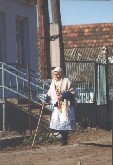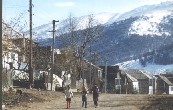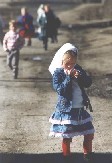A Handful of Russia in the Armenian Highlands
By Mark Grigorian, with photos by Ruben Mangasaryan.Translated from Hayatsk Yerevanits (A View from Yerevan) No. 2 (23) -- February 2000 -- Pages 20-23
[Grigorian is an internationally known journalist and media analyst. Mangasaryan is a internationally respected news and Armenian photographer. This team brings journalistic excellence and attention to this rare documentary article about the last Spiritual Christians in Armenia. Mangasaryan died suddenly on March 21, 2009.]
History and Religion | Life | School | Cabbage | What Then? | Correspondence
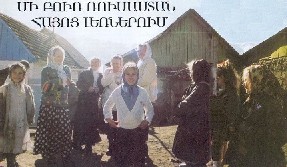 Strange feeling ...
In only two hours drive from Yerevan, you find yourself
in an entirely different world: birches, Russian cottages with
risible,
golden-haired children running around, and Russian speech heard
all
over
the place. You know you are in Armenia with the typical
Northern-Armenian
mountains around. But if you look at the people and the village,
you
will
see a small real Russian countryside — glubinka.
Strange feeling ...
In only two hours drive from Yerevan, you find yourself
in an entirely different world: birches, Russian cottages with
risible,
golden-haired children running around, and Russian speech heard
all
over
the place. You know you are in Armenia with the typical
Northern-Armenian
mountains around. But if you look at the people and the village,
you
will
see a small real Russian countryside — glubinka.
We are in Fioletovo, a village of Spiritual Christians Molokans. That is how ethnic Russians, sectarians, who were moved to the South Caucasus in the beginning of the XIX century, are called in Armenia. Interestingly, they Molokans do not acknowledge themselves as Russians. "We are not Russians, we have our own religion," they say.
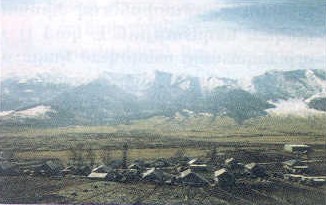 Fioletovo
(formerly Nikitino) is the last Spiritual Christian Molokan village in Armenia. Fioletov
was
an activist of the 1917 Russian revolution. The village was
renamed
after
him. There are no other villages in our country inhabited by Spiritual Christians Molokans
only.
Well, there is also Lermontovo,
a village several kilometers [north] from Fioletovo, but there
are more
than 50 houses belonging to Armenians and Kurds. And we, who
live in
Yerevan,
still believe there are
Fioletovo
(formerly Nikitino) is the last Spiritual Christian Molokan village in Armenia. Fioletov
was
an activist of the 1917 Russian revolution. The village was
renamed
after
him. There are no other villages in our country inhabited by Spiritual Christians Molokans
only.
Well, there is also Lermontovo,
a village several kilometers [north] from Fioletovo, but there
are more
than 50 houses belonging to Armenians and Kurds. And we, who
live in
Yerevan,
still believe there are
Spiritual Christian Molokan villages in Northern Armenia,
while the
only thing left from them are their names on the maps: Belaya
Tserkov, Kruglaya
Shishka, Medovka,
Novoseltsovo, Blagodarnoe, Privolnoe
...
[Also see Virtual Armenia. Click on Province #7 Lori, then Village #118: "Fioletovo ... was founded in the late 1820s by Spiritual Christians Russian schismatics exiled [many voluntarily] from Tambov District. Formerly Nikitino, the village was renamed in 1936 in honor of Ivan T. Fioletov, an old Socialist activist shot with the other Baku Commissars in 1918."]
Spiritual Christians Molokans live clean and tidy but poor.
According to the data provided by Ivan Yakovlevitch Semenov, the President of the Foundation for Assistance to Russian Compatriots in Armenia, there are 5,000 Spiritual Christians Molokans left in the country, including 1.500 in Fioletovo.
History and Religon
The history of Spiritual Christians Molokans is both well explored and full of legends. The very name "Molokans" is explained in different ways. "There is a version that during baptizing they pour milk into the forehead," said Vladimir Grigorian, Chairman of the "Armenia-Russia" association. "However, the origins of the name "Molokans" are more likely to come from river "Molochnaya" in the Tavricheski region, where they lived for several decades in banishment.Ivan Yakovlevitch Semenov sticks to another version, in which Molokans did not abide the vigils, accepted by the Orthodox Church, and ate milk during banian [bath] days. [The Thursday before Paskha is bannie, a special bathing day.] Milk in Russian is moloko. The word Molokan may come from it.
Most of the Molokans belonged to the Dukhobor sect, which emerged in Russia in the mid 17th century and ascends from the Lutheranism. [Dukhobors ascended from Russian Spiritual Christians, then called Iconobors.] The term "dukhobor" means "a fighter for the spirit and the truth." Molokans consider that every believer should satisfy his or her spiritual needs and perfect the behavior and feelings. An important role in their religion plays the theory about transmigration of Jesus Christ's soul from father to son. Spiritual Christians Molokans decline the worship of images — icons and crosses.
Spiritual Christians Molokans live in a close community, members of which seek realization of their social ideals: nonviolence, brotherhood, equality, economic cooperation, spiritual perfection. "We do not enforce anyone to do anything," said one of the Fioletovo dwellers, "the religion does not allow it. That is how we live — without any enforcement."
Life
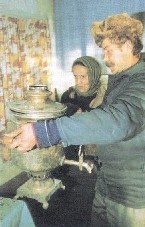 Restraint
is a very
important mark of Spiritual
Christian Molokans'
life. Spiritual Christian Dukh-i-zhizniki often
They do not
allow
taking photographs of themselves, very few of them would let
photographing
the interior of their cottage. Ivan Semenov thinks due to this
restraint
the Spiritual Christian
Molokan communities
remained till now, for one and a half century,
being surrounded by an alien nation. They survived through seventy
years
of Soviet power, religious and national persecution.
Restraint
is a very
important mark of Spiritual
Christian Molokans'
life. Spiritual Christian Dukh-i-zhizniki often
They do not
allow
taking photographs of themselves, very few of them would let
photographing
the interior of their cottage. Ivan Semenov thinks due to this
restraint
the Spiritual Christian
Molokan communities
remained till now, for one and a half century,
being surrounded by an alien nation. They survived through seventy
years
of Soviet power, religious and national persecution.
"We are free now," said Ivan, a Fioletovo inhabitant, "Before the earthquake it was really hard — they prosecuted us and did not let us believe in God. Now we can believe the way we want, and we can do the rituals." The life for Spiritual Christians Molokans is divided into two periods — "before the earthquake in 1988" and "after." The earthquake shock was more powerful for them, than the collapse of the USSR.
A cottage, or as Spiritual Christians Molokans themselves call it in an old Russian manner, izba) usually has one or two rooms. On Sundays they put the Holy Bible on the table. Many of those books are pre-Soviet, written in the old Russian alphabet." Reading the Bible is an important part of the children upbringing. "During the winter evenings, we gather with all our family, read the Bible, talk ... in summers there is almost no time."
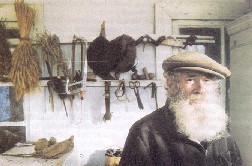 Not all families have
television sets. "Presbyters (leaders of the prayerful
gatherings) do not categorically forbid watching TV, but do not
recommend
it as moral considerations require," said Ivan Semenov. "That is
why
many
houses have no TV sets. However, on Sundays in the House of
Culture of
Fioletovo, some kind of businessmen got a TV set and let the
kids watch
it for money." Spiritual
Christians Molokans are allowed to listen to the
radio and read
newspapers.
Not all families have
television sets. "Presbyters (leaders of the prayerful
gatherings) do not categorically forbid watching TV, but do not
recommend
it as moral considerations require," said Ivan Semenov. "That is
why
many
houses have no TV sets. However, on Sundays in the House of
Culture of
Fioletovo, some kind of businessmen got a TV set and let the
kids watch
it for money." Spiritual
Christians Molokans are allowed to listen to the
radio and read
newspapers.
Sunday is a holiday for Spiritual Christians Molokans. In the morning, everyone goes to the praying house ("to the gathering"). Then, girls wear their white Sunday shirts, fillet their white lacy shawls and walk around the village, nibbling sunflower seeds. The boys, as usual, are near them. "Every Sunday is a holiday for us, like the New Year is for you." The elders visit each other. It is prohibited to work Sundays.
Strictly speaking, Spiritual Christians Molokans may not drink alcohol or smoke cigarettes. However, the youngsters and the middle-aged generation break that taboo. There are two retailer's shops in the village where one can unofficially get a drink since morning. "Every Sunday they gather over there, drink and fight in the evening," said Gohar, the seller at the competing shop. They call her "Goarka" in the village. On the little table in her shop one can notice canned goods, cigarettes, and smoked fish along with the Bible in Armenian.
School
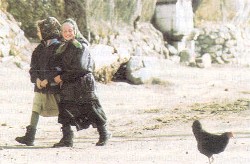 There is an
eight-year school in Fioletovo.
Another one is in Lermontovo.
There are no other Russian-language schools for Spiritual Christians Molokans in
Armenia.
After
graduating from an eight-year school, the Spiritual Christian Molokan children
would have
to
go to an ordinary Armenian school, which they are not ready for.
According
to some data, during the past 20 years, no one from Fioletovo
tried to
enter a university.
There is an
eight-year school in Fioletovo.
Another one is in Lermontovo.
There are no other Russian-language schools for Spiritual Christians Molokans in
Armenia.
After
graduating from an eight-year school, the Spiritual Christian Molokan children
would have
to
go to an ordinary Armenian school, which they are not ready for.
According
to some data, during the past 20 years, no one from Fioletovo
tried to
enter a university.
The school is paid. They take 1,000 drams [$2] from every pupil a month. Rarely a Spiritual Christian Molokan family has only one or two children — the religion does not allow restraining birth. So, Spiritual Christians Molokans have to pay from four to five thousand drams [$8 to $10] monthly for school. There are families where children study in turn. There are also families that take children from schools after they have learned literacy. [At the time this was written 500 dram = US$ 1.]
I could not meet the school director. He does not live in Fioletovo. They say he is a dentist and has patients in Vanadzor (Kirovakan) . All other teachers live in Vanadzor (Kirovakan) as well, except Nadezhda Petrovna (she teaches Russian) and Nyusya Zadorkina (all subjects in the elementary school). Children call her "Aunt Anya."
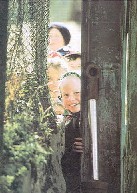 "These
schools are state-run," said Ivan Semenov. "They have to be
unpaid. But
there are no local teachers. They started bringing teachers by a
liner
bus from Vanadzor. A teacher's salary is about 4.000 drams
($7.50) [per
month] and is not enough to pay for the bus tickets.
That is why
they started collecting 1.000 drams ($2) monthly from each
pupil. Who
is
not capable to pay, should not go to school. We talked several
times
with
representatives of the regions' educational authorities but all
in
vain."
"These
schools are state-run," said Ivan Semenov. "They have to be
unpaid. But
there are no local teachers. They started bringing teachers by a
liner
bus from Vanadzor. A teacher's salary is about 4.000 drams
($7.50) [per
month] and is not enough to pay for the bus tickets.
That is why
they started collecting 1.000 drams ($2) monthly from each
pupil. Who
is
not capable to pay, should not go to school. We talked several
times
with
representatives of the regions' educational authorities but all
in
vain."
"The question of payment for the education is not within the competence of the educational authorities. The law enforcement agencies should enter into that," Vladimir Grigorian said.
The bus, by which the teachers from Vanadzor come, travels two times a day. First time it comes to the village at 10 a.m., and the second time — at 1:30 p.m. So, the lessons last from ten to half past one. They say there was a school bus in Fioletovo before, but it is not there any longer. It disappeared.
The textbooks are old, left from the Soviet times. Sometimes the organization headed by Ivan Semenov manages to bring a few sets to the schools. And that is all. "The textbook problem is under the direct control of the ambassador," said Vladimir Khrulev, Counsel of the Russian Federation in Armenia. Let us hope that as a result of it children will get an opportunity to study with new textbooks.
But I have a question then. How come poor Armenia is capable of providing textbooks to more than 200 Armenian language schools in Georgia, while the great Russia can not do the same for two little country schools in Armenia?
Cabbage
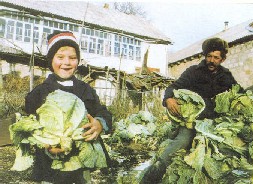 We always associate
the sauerkraut with Spiritual
Christians Molokans.
Red-cheeked, joyful
young
Russian women in shawls selling sauerkraut became an inseparable
part
of
Armenian markets. In Fioletovo and Lermontovo a kilogram of
cabbage
costs
20 drams (less than 1 cent). To pay for a month of study for one
child,
one will need to grow and sell 50 kilos [110
pounds] of cabbage. And they will be lucky if
there is a
buyer.
"That
is
not fair!" exclaimed my daughter when I told her about that.
We always associate
the sauerkraut with Spiritual
Christians Molokans.
Red-cheeked, joyful
young
Russian women in shawls selling sauerkraut became an inseparable
part
of
Armenian markets. In Fioletovo and Lermontovo a kilogram of
cabbage
costs
20 drams (less than 1 cent). To pay for a month of study for one
child,
one will need to grow and sell 50 kilos [110
pounds] of cabbage. And they will be lucky if
there is a
buyer.
"That
is
not fair!" exclaimed my daughter when I told her about that.
Spiritual Christians Molokans do not only sell the cabbage — the also pickle it. The Molokan sauerkraut is highly valued on the south of Russia. During the Soviet years, Spiritual Christians Molokans exported their sauerkraut. Now they export their "know-how". They go to Krasnodar and Stavropol' regions in Southern Russia, where they buy barrels and cabbage. Then they pickle and sell it. There are families that established a business and are doing quite well with it in Russia. "Though it is not tasty there," they say, "the cabbage is different, because of the water. The water in Armenia is better."
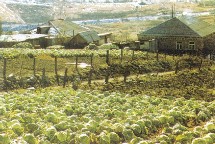 I was told in Fioletovo, how
to make a real "Spiritual
Christian Molokan"
sauerkraut. It should
be chopped, then washed (that was specially mentioned) and after
that
carrot
should be added, after it is pared and macerated ("unless it
will color
the cabbage"). For a bucket of cabbage, a handful of carrots and
a
little
bit more than that of salt are needed. A black pepper and bay
should be
added. In eight to ten days, the sauerkraut is ready.
I was told in Fioletovo, how
to make a real "Spiritual
Christian Molokan"
sauerkraut. It should
be chopped, then washed (that was specially mentioned) and after
that
carrot
should be added, after it is pared and macerated ("unless it
will color
the cabbage"). For a bucket of cabbage, a handful of carrots and
a
little
bit more than that of salt are needed. A black pepper and bay
should be
added. In eight to ten days, the sauerkraut is ready.
However, I have to admit I have not ever used this recipe.
What Then?
National minorities of course, should emigrate from a country, which is left by masses of representatives of the title nationality. But the emigration of Molokans, which is threatening to liquidate that community, will mean for us, Armenians a loss of our own identity, a loss of a part of Armenia. We should understand it. By the way, inhabitants of Vanadzor (Kirovakan), Karmir (Krasnoselsk) and of some other northern Armenian towns and villages do understand it. "We had always lived together," said Hakob from Vanadzor (Kirovakan) who refused to give his surname. "Spiritual Christians Molokans are tidy people. We always bought cabbage, milk and butter from them. I like being their neighbor ..."Correspondence from the author, Mark Grigorian < markos@media.am >
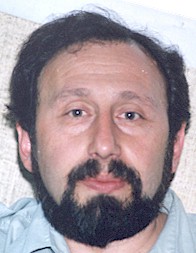 I do speak English, and I do write English,
and I did
the translation
of the article.
I do speak English, and I do write English,
and I did
the translation
of the article.
When I was writing the story, US$ 1 was equal to approximately 500 drams, and not over 1,000.
BTW [by the way], I met a Spiritual Christian Molokan guy yesterday, who said he has Konovalov relatives in Krasnosel'sk.
About the religious peculiarities: About Baptism, I have sources: a paper by Ilya Semenov "The Spiritual Christians Molokans of Armenia" printed in "Nationalities of Armenia", Yerevan, 1999 (Semenov was quoted in my story), and a book, which was published in Tbilisi, Georgia by the Caucasian Institute for Peace, Democracy and Development and is called "Poly-ethnic Society and Conflict". [Also see The Spiritual Christians Molokans in Armenia, by Ivan Iakov. Semyonov]
About Spiritual Christians Molokans and Dukhobors (in Georgia): Everybody says, they are different. But all sources (written and oral) mention the same history same place of origin, same religious peculiarities. This is something, which needs to be talked about. [Here Grigorian reports that little is commonly known by the average citizen about the many varieties of Spiritual Christian in the Caucasus who are lumped together as old Russian faiths, often all incorrectly called starovery or Molokane as if they were all the same.]
The photos are coming... [Thanks to Mark for e-mailing photos not printed.]
Molokane, Pryguny and Dukh-i-zhizniki Around the World
